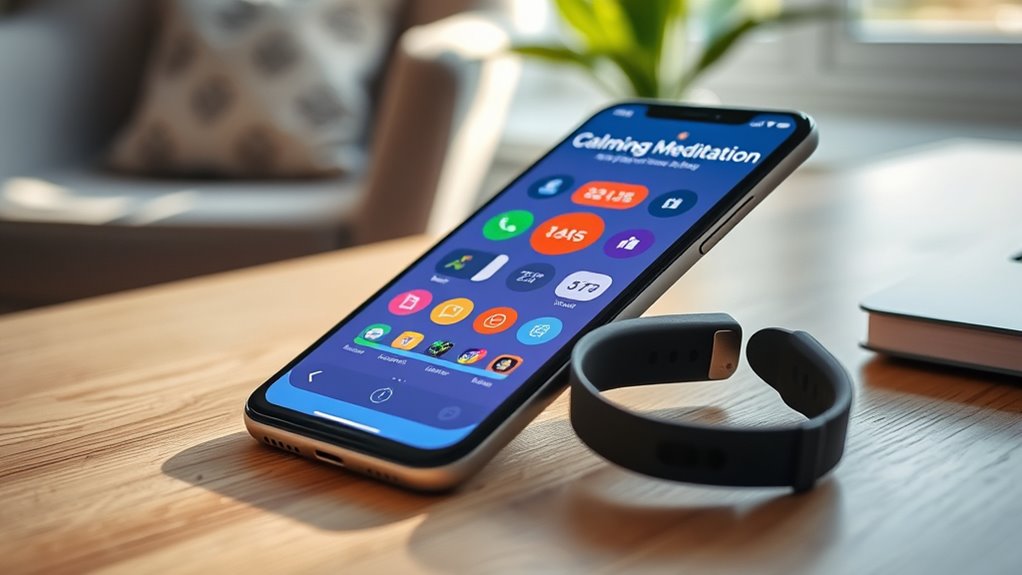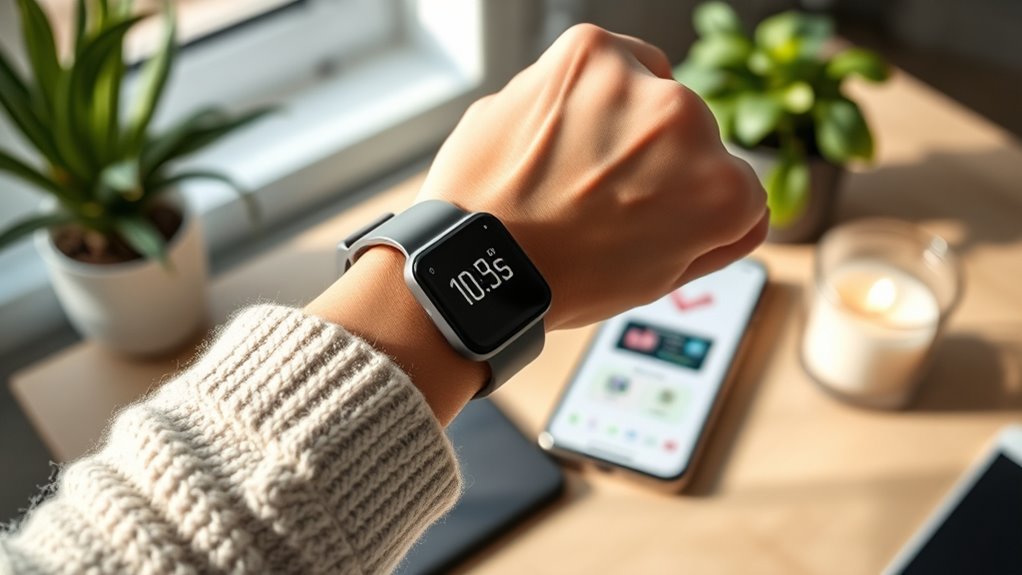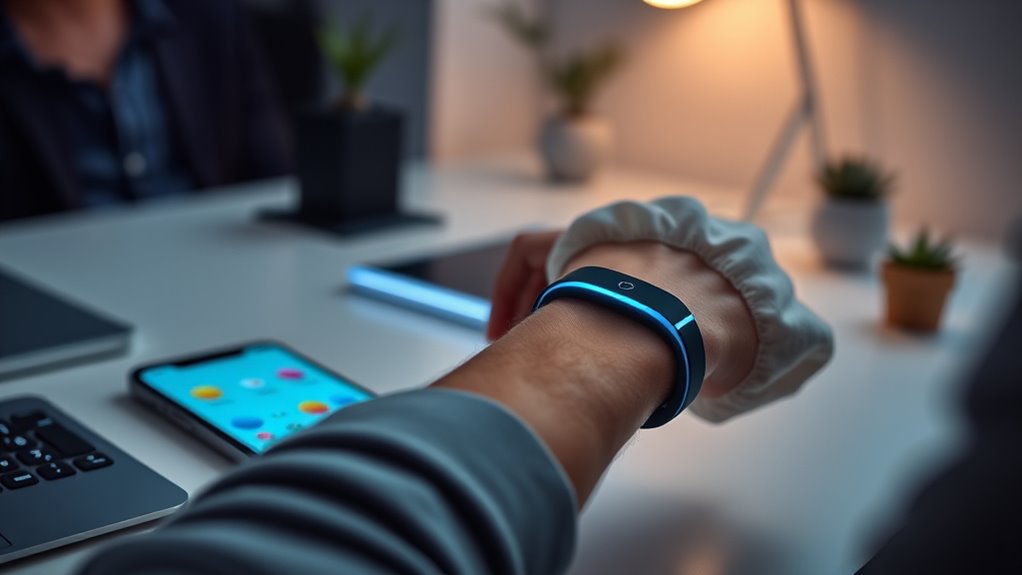Digital therapeutics and wearables are revolutionizing your mental wellness by offering personalized, easy-to-access tools that support stress management, emotional monitoring, and resilience building. These technologies complement traditional therapy, providing real-time feedback through sensors that track physiological signals like heart rate and skin conductance. They also include apps with mindfulness exercises, sleep tracking, and mood journaling. To discover how these innovative tools can enhance your mental health journey, explore what’s possible next.
Key Takeaways
- Digital therapeutics deliver evidence-based mental health interventions via apps and online platforms, emphasizing personalization and cultural relevance.
- Wearables monitor physiological signals like heart rate and skin conductance to detect stress and emotional responses in real time.
- These tools enable mood tracking, relaxation exercises, and biofeedback, supporting proactive stress management and mental resilience.
- They enhance therapy accessibility, provide continuous support, and integrate features like sleep tracking and community engagement for holistic care.
- Future trends include virtual reality and AI-driven chatbots, offering immersive, personalized mental wellness experiences and immediate support.
Understanding Digital Therapeutics in Mental Health

Digital therapeutics are innovative tools that deliver evidence-based mental health interventions through digital platforms like apps and online programs.
Digital therapeutics provide evidence-based mental health support through apps and online platforms.
They often incorporate holistic approaches, addressing mental health from multiple angles—emotional, physical, and social. This all-encompassing view helps tailor treatments to individual needs, promoting better outcomes.
Cultural considerations are crucial in digital therapeutics, ensuring interventions respect diverse backgrounds and belief systems. By integrating cultural sensitivity, these tools become more accessible and effective across different populations.
As you explore digital therapeutics, you’ll notice how they blend scientific research with personalized care, making mental health support more flexible and user-centric. This approach empowers you to actively participate in managing your mental wellness within a culturally competent framework.
The Role of Wearables in Monitoring Emotional Well-being
Wearables can help you track your emotional responses throughout the day, giving you insights into how your mood shifts. They also detect stress levels in real time, alerting you when you might need to take a moment to relax. Additionally, some devices incorporate mindfulness techniques to guide you through breathing exercises and meditation practices, further supporting mental wellness. These insights can empower you to develop personalized mental health strategies, enabling a more proactive approach to emotional care. By integrating mental health tracking features, these devices enable personalized approaches to managing emotional well-being. Incorporating ergonomic design principles from remote work setups can enhance comfort during extended use, helping to prevent physical strain while focusing on mental health.
Tracking Emotional Responses
Have you ever wondered how technology can help you understand your emotional health more accurately? Wearables now track your emotional responses by monitoring physiological signs like heart rate variability and skin conductance. A new sentence with performance tuning and the rest of the sentence. This data reveals your emotional triggers and helps identify recurring mood patterns. By observing these responses in real time, you gain insights into how certain activities, environments, or thoughts influence your feelings. This awareness allows you to recognize early signs of emotional shifts and take proactive steps to improve your well-being. Additionally, integrating AI security measures ensures that your sensitive health data remains protected while you monitor your mental wellness daily. Implementing emotion recognition algorithms further enhances the ability to interpret subtle physiological cues, providing a comprehensive view of your emotional landscape. Incorporating data privacy practices is essential to maintain trust and safeguard your personal information. Understanding the importance of biometric data collection helps you make informed decisions about your health tracking. Tracking emotional responses becomes a powerful tool in managing your mental wellness daily.
Detecting Stress Levels
Ever wondered how you can instantly gauge your stress levels throughout the day? Wearables equipped with stress detection sensors make this possible. These devices monitor physiological signals like heart rate variability, skin conductance, and respiration. Using biofeedback techniques, they provide real-time insights into your emotional state. By analyzing these signals, wearables can detect rising stress levels early, prompting you to take calming actions. Here’s a quick look at key features:
| Feature | Function | Benefit |
|---|---|---|
| Heart Rate Variability | Measures fluctuations in heartbeats | Indicates stress response |
| Skin Conductance | Detects sweat gland activity | Reveals emotional arousal |
| Respiration Rate | Tracks breathing patterns | Shows relaxation or tension |
| Data Alerts | Sends notifications when stress levels spike | Promotes immediate self-awareness |
| Biofeedback Integration | Offers calming exercises based on sensor data | Enhances emotional regulation |
These tools empower you to actively monitor and manage stress in real-time. Additionally, some wearables incorporate stress management techniques that help users develop healthier responses to stressors, aligning with a broader understanding of mental wellness tools. Incorporating essential oils into your self-care routine can further support relaxation and emotional balance, complementing digital stress management methods. Moreover, integrating wearable stress detection with mindfulness practices can significantly improve overall mental health outcomes, especially for new parents managing various stressors.
Key Features and Benefits of Mental Wellness Apps

What makes mental wellness apps so effective is their ability to offer personalized support right at your fingertips. They provide tailored programs that focus on your specific needs, such as mindfulness meditation exercises to reduce stress and improve focus. Essential oils are also gaining popularity as complementary tools for enhancing mental well-being, offering natural relaxation and mood improvement. Many apps also include sleep tracking features, helping you monitor and enhance your sleep quality, which is essential for mental health. These tools often incorporate mood journaling, breathing exercises, and relaxation techniques to help you manage daily stressors. The convenience of accessing these features anytime encourages consistent practice, fostering better mental resilience. Additionally, some apps incorporate wall organization concepts that promote a calming and clutter-free environment to support mental clarity. Moreover, some apps incorporate vibrational energy concepts that align your mental state with positive outcomes. Recognizing the importance of emotional support, these apps often facilitate community engagement or access to professional help when needed. Incorporating biometric data can further personalize mental health strategies, making them more effective. By combining these key features, mental wellness apps empower you to take control of your mental health, making support accessible, engaging, and adaptable to your lifestyle.
How Digital Tools Complement Traditional Therapy

Digital tools now play a vital role in enhancing traditional therapy by providing ongoing support between sessions. They help you stay engaged and reinforce strategies learned during face-to-face meetings. These tools can help reduce digital stigma by normalizing mental health care and making it more approachable. Additionally, the integration of intelligent tutoring systems into mental health apps can allow for more adaptive and personalized interventions. They increase therapy accessibility, especially for those who face barriers like transportation or time constraints. You can track your mood, practice exercises, or communicate with your therapist securely, creating a seamless connection. Moreover, some digital therapeutics incorporate features that allow for real-time feedback and adjustments to your treatment plan, further enhancing personalized care. AI’s recent discoveries in the healthcare industry demonstrate the potential for innovative digital solutions to revolutionize mental health treatment. Utilizing predictive modeling in mental health applications can help identify early warning signs and tailor interventions more effectively. Advances in wearable technology enable continuous monitoring of physiological signals, providing additional data points for personalized care. Digital therapeutics and wearables offer personalized insights that complement your in-person sessions, making your mental health journey more consistent and effective. By integrating technology with traditional methods, you gain continuous support tailored to your needs, fostering better mental wellness outcomes.
Challenges and Considerations in Using Digital Mental Health Solutions

While digital mental health solutions offer many benefits, they also present several challenges that users must consider. Privacy concerns are a top issue; your sensitive data might be vulnerable if security isn’t robust. Maintaining user engagement can also be difficult; apps and wearables need ongoing motivation to be effective. Additionally, not all solutions are evidence-based, so you might encounter tools that lack scientific validation. Finally, digital solutions can sometimes feel impersonal, making it harder to build trust or feel understood. To navigate these challenges, you should evaluate privacy policies carefully, choose engaging and reputable platforms, verify scientific backing, and remain aware of potential limitations in digital interactions. Understanding tableware can help you appreciate the importance of quality and authenticity in your choices, even in digital health tools. Being informed helps you maximize benefits while minimizing risks.
Future Trends in Digital Mental Wellness Technologies

Advancements in technology are shaping the future of mental wellness tools, making them more personalized, accessible, and effective. Virtual reality will likely play a bigger role, immersing users in calming or therapeutic environments to reduce anxiety and improve emotional regulation.
AI chatbots will become smarter, offering real-time support, guidance, and even early detection of mental health issues through advanced algorithms. These tools will adapt to your specific needs, creating tailored interventions that fit seamlessly into your daily life.
As technology evolves, expect more integration of virtual reality and AI-driven solutions, making mental health care more engaging, immediate, and stigma-free. This progress promises to expand access and improve outcomes for individuals seeking mental wellness support.
Frequently Asked Questions
How Effective Are Digital Therapeutics Compared to Face-To-Face Therapy?
Digital therapeutics can be quite effective, especially for mild to moderate mental health issues, but their therapeutic effectiveness varies.
Compared to face-to-face therapy, they often provide more accessibility and convenience, though they might lack the personal connection some need.
In a face-to-face comparison, traditional therapy is usually more tailored and nuanced, but digital options excel in consistency and immediate support.
Your choice depends on your specific needs and preferences.
What Privacy Measures Protect My Mental Health Data on These Platforms?
Think of your mental health data as a treasure chest; privacy measures like data encryption lock it tight, preventing unauthorized access. Platforms prioritize user anonymity, ensuring your identity stays hidden.
For example, some apps anonymize data before sharing, like a secret kept under lock and key. Rest assured, these security practices protect your sensitive information, giving you confidence to focus on your mental wellness journey without worry.
Can Wearables Diagnose Mental Health Conditions Independently?
Wearables can’t diagnose mental health conditions independently due to their diagnostic limitations.
While they offer valuable insights through wearable accuracy in tracking data like heart rate and activity, they lack the all-encompassing assessment needed for diagnosis.
You should consult mental health professionals for accurate diagnosis and treatment, as wearables serve better as supplementary tools rather than standalone diagnostic devices.
Always interpret wearable data with caution and professional guidance.
Are Mental Wellness Apps Suitable for All Ages and Tech Literacy Levels?
Mental wellness apps aren’t suitable for everyone, especially those facing usability challenges or accessibility barriers. If you’re less tech-savvy or have difficulty orienting yourself within digital tools, these apps may feel overwhelming or inaccessible.
While they can benefit many, it’s important to think about individual comfort with technology. Choosing user-friendly apps designed for diverse needs can help bridge the gap, but always assess if the app aligns with your age and tech literacy level for effective support.
How Do Digital Tools Adapt to Individual Mental Health Needs Over Time?
Think of digital tools as a gardener tending to your mental health. They use personalization algorithms to understand your unique needs, like recognizing different plants’ care.
Adaptive feedback then acts as the water and sunlight, adjusting suggestions based on your progress.
Over time, this personalized approach helps the tools evolve with you, ensuring your mental wellness journey stays relevant, supportive, and effective, just like a well-tended garden flourishing through tailored care.
Conclusion
While digital mental health tools might seem impersonal, they offer accessible support anytime you need it. They don’t replace traditional therapy but enhance your overall well-being by providing ongoing monitoring and personalized insights. Embracing these tools doesn’t mean abandoning professional help; instead, it empowers you to take charge of your mental wellness in a way that fits your busy life. With thoughtful use, digital therapeutics and wearables can truly complement your mental health journey.








